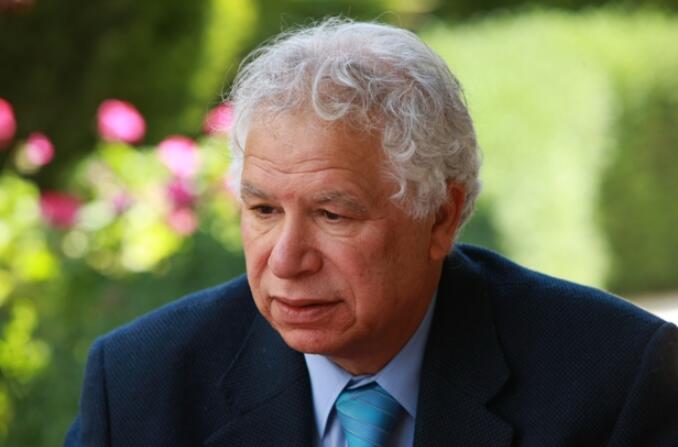It was not homesickness he felt, as he shifted his bags and wrote his poems, producing a dozen volumes by the end. Nostalgia was lazy, futile. What he felt was that his will had been broken and replaced by simple anger.
他一邊四處漂泊,一邊進(jìn)行詩(shī)歌創(chuàng)作,最后寫(xiě)出了十多本詩(shī)集時(shí),他感受到的并不是思鄉(xiāng)之苦。懷舊是懶惰、徒勞的。他覺(jué)得自己的意志被摧毀,取而代之的只有憤怒。
And the question was how to express it, as a poet. He did not want to write in the classical Arab style; he had come to Cairo deliberately to keep off the mapped road. Nor did he want to shout for intifada; his ways were quieter. For a while, in Cairo and Beirut, he worked for Radio Palestine, but the bombast and sloganeering of politics repelled him.
作為一名詩(shī)人,問(wèn)題是如何將這種情緒表達(dá)出來(lái)。他不想用古典的阿拉伯風(fēng)格寫(xiě)作;他特意來(lái)到開(kāi)羅,不想按照既定的套路寫(xiě)作。他也不想為起義軍站臺(tái);他的生活方式更加安靜。他曾在開(kāi)羅和貝魯特為巴勒斯坦廣播電臺(tái)工作過(guò)一段時(shí)間,但他對(duì)政治的夸夸其談和口號(hào)感到厭惡。

As a lover of freedom, he could not join a party or pledge allegiance to anyone: all you need to make a tyrant, he wrote, “is a single bend of the knee”. He hated Israel, the occupier, who had taken what was his and covered it with smart white settlements; but he also loathed the Palestinian parties, Fatah, riddled with corruption, and Hamas, naively peddling myths of power.
作為一個(gè)熱愛(ài)自由的人,他無(wú)意加入什么政黨,也不會(huì)向任何人宣誓效忠:他寫(xiě)道,要造就一個(gè)暴君,“只需單膝下跪”。他憎恨占領(lǐng)者以色列,他們奪走了屬于他的國(guó)土,在土地上蓋起了扎眼的白色建筑;但他也憎恨巴勒斯坦政黨,法塔赫的內(nèi)部已經(jīng)腐敗不堪,而哈馬斯天真地兜售權(quán)力的神話(huà)。
In 1999, working briefly for the Palestinian Authority in Ramallah, he tried to blow the whistle on the siphoning-away of funds for a World Bank project. He resigned when he made no impression.
1999年,在拉姆安拉的巴勒斯坦權(quán)力機(jī)構(gòu)短暫工作期間,他試圖揭發(fā)世界銀行項(xiàng)目資金被挪用的丑聞。舉報(bào)無(wú)果后,他就辭職了。
His poems had to speak instead. He wrote them as a deliberate contrast to the frothing politicians, simple, concrete, cooled down. He kept his gaze on everyday things, ordinary pleasures and troubles: leading the reader to a window, leaving him to look out. He did not write about blood, rifles, the nation, the word “Palestine”. That pain would appear, he felt, even when he described a forest or a flower—or a small tear in a shirt, which a jailer might have made.
他只能用作品表達(dá)。他創(chuàng)作詩(shī)歌是為了刻意與那些浮躁的政客形成對(duì)比,簡(jiǎn)單,具體,冷靜。他時(shí)常關(guān)注日常的事物,普通的快樂(lè)和煩惱,把讀者引到窗前,讓讀者自己欣賞。他不會(huì)寫(xiě)關(guān)于鮮血、步槍、國(guó)家(“巴勒斯坦”這個(gè)詞)。即使描寫(xiě)了一片森林或一朵鮮花,或者可能是獄卒把襯衫弄破了一個(gè)小洞,他也會(huì)把那種痛苦通過(guò)筆端表達(dá)出來(lái)。
As for his own uprooting, “I rubbed the leaf of an orange in my hands/As I had been told to do/So that I could smell its scent/but before my hand could reach my nose/I had lost my home and become a refugee.”
至于自己“背井離鄉(xiāng)”,他寫(xiě)道:“前輩曾告知,欲聞橘香氣,雙手搓橘葉,然尚未觸鼻,故土已陷落,此后無(wú)根基。”
譯文由可可原創(chuàng),僅供學(xué)習(xí)交流使用,未經(jīng)許可請(qǐng)勿轉(zhuǎn)載。











